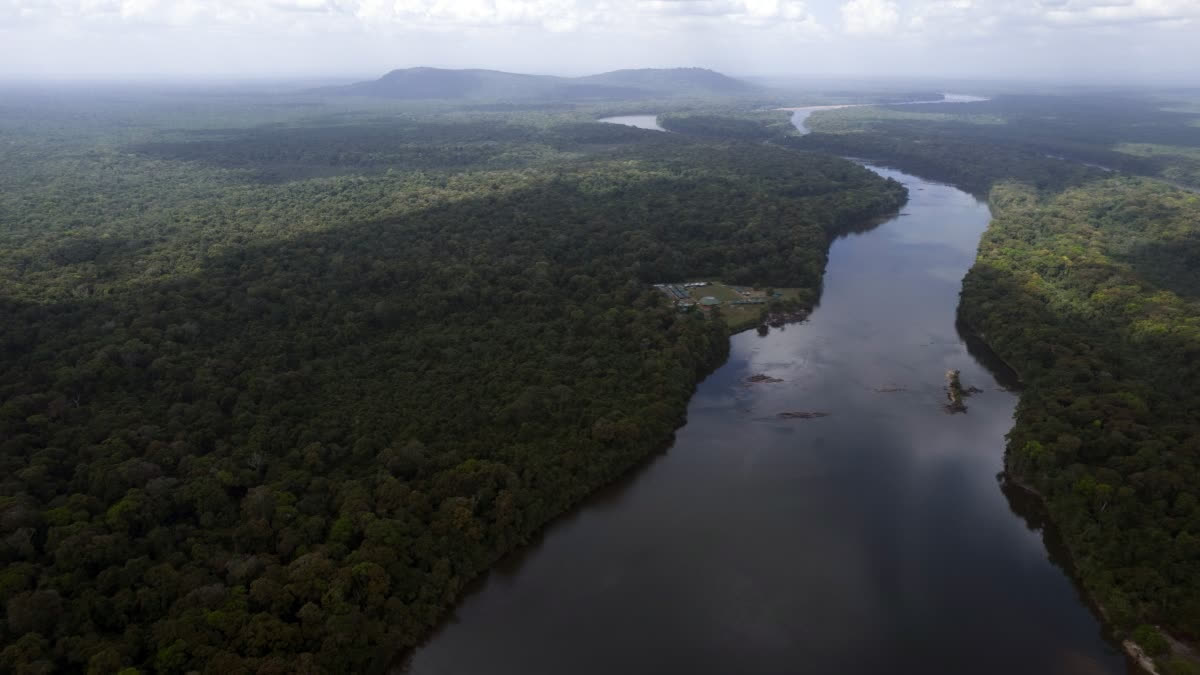New Delhi: India’s reiteration on Tuesday that the issue of Venezuela’s claim over the Essequibo region in Guyana should be resolved peacefully reflects New Delhi’s concern over the escalation of the problem between the two South American neighbours. “We are closely following the developments pertaining to the Guyana-Venezuela border issue,” the External Affairs Ministry said in a statement. “We are aware that the matter is already being considered by the International Court of Justice. We believe the issue should be resolved peacefully and escalatory steps avoided. We welcome the recent regional diplomatic initiatives on the issue.”
Last week, during his weekly media briefing, External Affairs Ministry spokesperson Arindam Bagchi also stated that India “always advocated resolution of disputes through dialogue and diplomacy, but for the moment I would say we’re just keeping a close eye on seeing what's happening”.
The long-standing dispute escalated into a crisis earlier this month when Venezuela held a referendum to strengthen its claim over the Essequibo region in Guyana. The origin of the conflict dates back many years, with the current border established through the Paris Arbitral Award in 1899. Venezuela revived its territorial claim in 1962, leading to the matter being brought before the International Court of Justice (ICJ) in 2018.
The discovery of significant offshore oil reserves in the 2010s heightened tensions. In September this year, Guyana issued drilling licences in the disputed waters. Subsequently, this month, Venezuela conducted a referendum, posing questions about whether the region should become a state of Venezuela, and its inhabitants be granted citizenship. Despite a reported low turnout, the Venezuelan government asserted that the results indicated overwhelming support for such a move. Venezuela then escalated its efforts to assert its claim, including the publication of maps incorporating the contested territory into the country and the announcement of plans for the region’s development.
The referendum, it may be mentioned, was held within Venezuela only and the views of the people of Essequibo were not taken into account. The disputed territory of 159,500 sq km lies west of the Essequibo River. Following Venezuela’s actions, several nations, including Brazil, the UK and the US, rallied behind Guyana's stance. Brazil deployed troops to its border adjacent to the disputed region, while the US engaged in military exercises with Guyana. The ICJ cautioned Venezuela against taking direct action in the region, emphasising the scheduled trial in early 2024. The Mercosur regional group urged the parties involved to seek a peaceful resolution.
On December 9, Ralph Gonsalves, the Prime Minister of Saint Vincent and the Grenadines and current head of the Community of Latin American and Caribbean States (CELAC), announced his initiative to host a meeting between the leaders of Guyana and Venezuela. Brazilian President Luiz Inacio Lula da Silva was also extended an invitation to participate in the meeting. According to reports, Guyana’s President Irfaan Ali has agreed to hold a bilateral meeting with his Venezuelan counterpart Nicolas Maduro in the Eastern Caribbean island of St Vincent. So, why is the dispute between Guyana and Venezuela a cause of concern for India?
India’s relations with Guyana are warm and cordial with a high degree of understanding. The interaction is structured through periodic joint commissions, foreign office consultations, bilateral visits, cultural exchange programmes and Indian Technical and Economic Cooperation (ITEC) scholarship slots.
Since the 1830s, 1.2 million Indians went to Guyana as indentured labourers. Today, there are over 3,27,000 people of Indian origin in Guyana comprising the largest ethnic group in that country. Economic and trade relations between India and Guyana are structured through the Indo-Guyana Joint Commission, which was set up in 1977. Total India-Guyana trade in 2021-22 amounted to $223.36 million with exports of $66.41 million and imports of $156.96 million, a tremendous increase from $46.97 million in 2020-21. During 2022-23 (up to September 2022) the trade amounted to $32.86 million with exports of $30.04 million and imports of $2.83 million. India’s single largest export item is pharmaceuticals and its single largest import item from Guyana is usually wood and wood products.
But, all this is set for a quantum leap with India and Guyana agreeing to cooperate in the hydrocarbon sector, including long-term crude purchases from the South American country and investment in its upstream sector. Since 2015, Guyana has emerged as a significant global player in the oil industry, with discoveries of crude oil reserves exceeding 11 billion barrels. This has positioned the small Caribbean nation as home to one of the largest oil reserves globally. Concurrently, New Delhi has actively pursued diversification in its oil supply sources, establishing agreements with countries such as Brazil and Colombia.
Talks are in progress between India and Guyana for an Indian role in the Starbroeck offshore oil block. As of now, the block is operated by US oil major ExxonMobil. But, next year, the Guyana government will take back 20 per cent of this oil block to explore bilateral partnerships for developing this part of the block. India’s ONGC Videsh is also looking for opportunities in the region.
India and Venezuela also share cordial relations. There is a similarity of views on major international, political and economic issues. Besides actively promoting bilateral relations, the two countries cooperate in multilateral forums.
Venezuela also used to be a major supplier of crude oil for India before the US sanctions imposed in 2019. Between 2017 and 2019, prior to the imposition of sanctions, India was importing roughly 3,00,000 barrels per day (bpd) of Venezuelan crude grades. Private refiners were the primary purchasers during this period, accounting for approximately 5-7 per cent of India’s total crude oil imports.
However, following the easing of the sanctions by the US in October this year, India is set to resume importing crude oil from Venezuela. According to reports, India’s Reliance Industries Ltd (RIL) is booking three tankers scheduled to load oil from the South American country this month and in January 2024. With India enjoying cordial relations with both Guyana and Venezuela and offshore oil in Essequibo at stake, New Delhi has reasons to be concerned about the territorial dispute between the two South American neighbours.
Also read: Guyana-Venezuela border issue be resolved peacefully; India closely following developments: MEA


